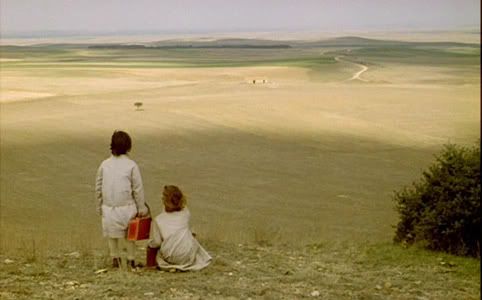#93-- The Spirit of the Beehive (1973)
The Spirit of the Beehive is about a family
paralyzed by an oppressive regime. They
lay, lifeless, like Ana, when she pretends to be dead, causing her sister
torment. There seems to only be two
options when surrounded by an omnipotent evil: pretend to be dead, never
moving, or rage against the evil, fight on every side, only to be captured and
destroyed, like the naïve monster in Frankenstein.
Ana recognizes that she has this
choice. She may only be a child, but the
choice is given to each individual. She
chooses to feed a rebel soldier, to keep him alive and hidden from those who
rule over them. This turns out badly for
everyone. But the lesson of
Frankenstein is: of course it will turn out badly. Fighting, even in small ways, against a great
bear only leads to destruction. But must not the bear who crushes and destroys
be fought, even if it means our own demise?
In the end, will it not bring freedom to everyone?
Isn’t martyrdom preferable to quiet
suffering? And can’t even a child do her
small part, accept her own martyrdom, for the sake of the greater good?
Fun Fact: Spirit of the Beehive was made in the last years of Franco's fascist Spain, using Spanish actors. sites and resources to make this anti-Franco film. It is symbolic to deceive the Spanish censors. One of the scenes was copied in Pan's Labyrinth, which takes place during Franco's Spanish Civil War.
Fun Fact: Spirit of the Beehive was made in the last years of Franco's fascist Spain, using Spanish actors. sites and resources to make this anti-Franco film. It is symbolic to deceive the Spanish censors. One of the scenes was copied in Pan's Labyrinth, which takes place during Franco's Spanish Civil War.

No comments:
Post a Comment